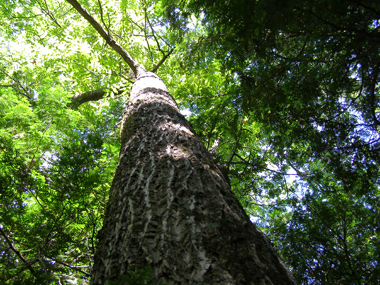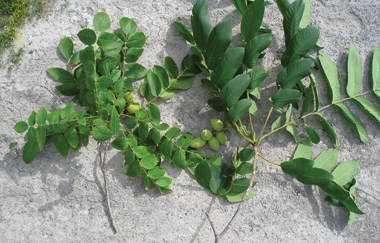We are working to help butternut persist on the landscape.
The Butternut Canker Disease is threatening the very survival of Butternut across the entire natural range in North America including the Butternut populations in eastern Ontario.
Butternut Recovery Program:

- informs landowners about the endangered status of Butternut and encourages them to maintain their healthy trees
- locates, assesses and maps healthy Butternut trees, to be logged in a seed-source geodatabase
- collects seeds from healthy trees and those showing signs of tolerance throughout Eastern Ontario
- grows seedlings from these seeds each fall at the Ferguson Forest Centre in Kemptville for the Landowner Butternut Planting Program, which:
- distributes 2,000 vigorous seedlings to hundreds of landowners across Eastern Ontario to replace dead and dying Butternut trees
- tracks survival and health of planted Butternuts via landowner volunteer reporting
- continually re-assesses the health of the butternut seed trees in the database and forecasts seed crops each summer
- collects leaves or buds from seed trees to DNA test for hybridization to ensure we are only collecting seeds from pure Butternut
- makes tolerant trees available for cloning to support the long-term grafting program managed by the Forest Gene Conservation Association (FGCA)
Species At Risk Compensation Program:
- makes Butternut seedlings available within MNRF Seed Zones 35 and 36 for MECP (Ministry of Environment, Conservation & Parks) compensation permits
- Seedlings are planted and maintained at several butternut groves on RVCA properties across the watershed
- These groves will be managed long-term as Butternut Seed Orchards for the recovery program.
Why Are Butternut Endangered?
Butternut trees in Eastern Ontario and across their entire natural range in North America are under attack by the Butternut Canker Disease. This is a deadly fungal disease that attacks all Butternut trees regardless of their age or size. There is no known cure for the disease but there is hope in locating trees that appear to have a natural tolerance to the disease. These rare individuals are the focus of the recovery program in Ontario for seed collection to produce vigorous seedlings for out-planting and to clone the genetic material of these trees through grafting in an effort to eventually save the species.
Butternut is classified as an endangered species under the Ontario Endangered Species Act (ESA 2007). It is illegal to harm or kill a naturally occurring Butternut tree without a Butternut Health Assessment. Seedlings planted through our program are exempt from the protection of the ESA.
Why are Butternut Important?
The Butternut (Juglans cinerea) is a native tree species that has co-existed as part of the Eastern Ontario forests for thousands of years. In Canada, it grows across southern Ontario, Quebec and New Brunswick. The presence of Butternut is important for several historical, ecological, economic and medicinal reasons:
- Butternut wood is cherished for fine furnishings, paneling, carving and turning
- Butternut bark, roots, nut oil and husks all have medicinal qualities ranging from arthritis and headache relief to lowering human cholesterol (please seek medical advice before trying)
- Butternut is an important food source for small mammals, birds and humans
- Edible nuts were used by First Nations and settlers for their high oil content and concentration of omega-3 fatty acids; the dried nuts can be stored for years
Get Involved!
There are three ways to get involved:
- If you have healthy butternut. Please contact Rose at
- If you want to plant butternut. Please contact Ian at
- If you want to volunteer to help collect seeds, let us know. Please contact Ian at
Contact:
Rose Fleguel, Butternut Recovery Technician
613-858-3678













